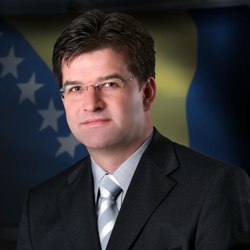Bosnia’s top international envoy, Miroslav Lajcak, is leaving his post in Bosnia. Lajcak, who has held both the head of the Office of the High Representative (OHR) and European Union Special Representative (EUSR) since July 2007, made the announcement in a news conference in Sarajevo on Friday, but refused to specify when he would leave Bosnia for good. He said that it is still unclear who will replace him and when the transition will take place.
“You can be sure that there will be no vacuum on the position of the High Representative,” Lajcak told journalists.
Sources told Balkan Insight that Lajcak may be leaving Bosnia within the next week or two. A senior Western diplomat said that this sudden decision in the middle of a deep political crisis puts the West in a very difficult position. The OHR, set up to monitor Bosnia’s post-war progress, was supposed to close by the end of the year as part of the country’s normalisation and move towards closer ties with the European Union.
An indication of the move first came a month ago when Lajcak was mentioned as one of three possible replacement for Slovak Foreign Minister, Jan Kubis, who is taking up a senior position at the UN in Geneva. At that time, Lajcak refused that option, saying he would be inappropriate to leave Bosnia at crucial times.
The country is struggling in the middle of the worst crisis since the end of the 1992-1995 war, while the international community and especially EU remain baffled regarding their future involvement.
Lajcak told media on Friday he had changed his mind and decided to accept the post only yesterday, after receiving a direct invitation from Slovak Premier during their meeting in Brussels.
He stressed that he has accepted the post under condition that he is allowed to continue working as Bosnia’s High Representative until a replacement arrives. As part of this arrangement, Lajcak will travel to Bratislava to officially assume the duty on Monday and will be back in Bosnia on Tuesday.
Western officials say it will be very difficult to find an appropriate candidate who would do the job for only few months, as the OHR was expected to close by the end of the year. The other option would be to find a candidate who would continue the work after OHR transforms into a new EU Special Representative’s Office. Yet that too would be difficult as few international officials would accept a post without knowing what their future mandate would be.
With that backdrop, Western diplomatic sources said they expected that Lajcak will eventually leave his post to his principle deputy, US diplomat Raffi Gregorian. That choice may cause additional frictions in Bosnia since Gregorian is at odds with the Government of the Serb-dominated Bosnian entity of Republika Srpska, which has recently even pressed criminal charges against him.
“It is clear to me that some people will accuse me of leaving Bosnia and Herzegovina stranded … and that I am fed up of everything,” Lajcak told journalists. “But that is not true.”.
He added that during the day he informed all Bosnian officials and institutions of his decision.
Some Bosnian officials, speaking on condition of anonymity, told the Balkan Insight that they were surprised with Lajcak’s sudden announcement, especially because he denied the possibility only a few weeks ago, and needed time to figure out what it would mean for the country.
The cabinet of the Bosniak (Bosnian Muslim) member of country’s tripartite presidency, Haris Silajdzic, issued a statement stressing that “it is necessary to maintain legal continuity of the Office of the High Representative and especially the continuation of its (governing) powers.”
The statement said that the “OHR presence is still needed in the country” and expressed hope that this will be recognized by the Peace Implementation Council, the international body charged with implementing the Dayton Peace Agreement that ended the war.
The top Bosnian Serb leader Republika Srpska Premier Milorad Dodik said there was nothing “spectacular” about Lajcak’s decision and wished him success in his new post and commended his work in Bosnia.
But in what appeared to be a direct reference to Gregorian, Dodik added that while choosing a replacement, the international community “must make sure” that such a person is “acceptable for everyone in Bosnia and Herzegovina.”





